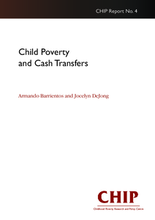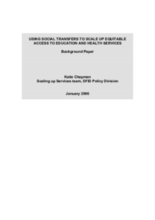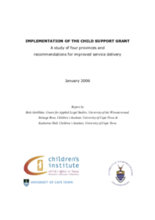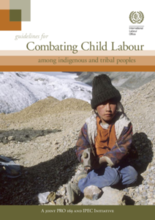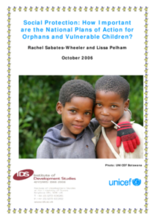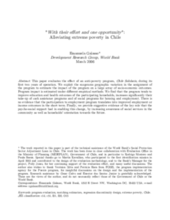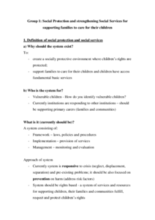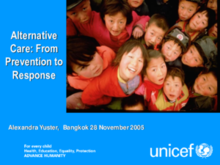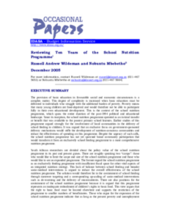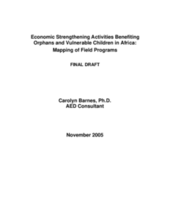Displaying 401 - 410 of 460
This paper examines the effectiveness of targeted cash transfers programs on reducing childhood poverty. It also explored the comparatives effectiveness of different kinds of cash transfers.
This paper focuses on the impact of one form of demand-side policy option - social transfers, particularly cash transfers and vouchers - on access to health and education services by the extreme poor.
Using fieldwork data from six sites, this report addresses the need for improved delivery of the Child Support Grant in South Africa. Includes a comprehensive review of the grant components and current system of delivery. Recommended changes to the act and regulations are highlighted.
Guidelines to address the specific needs and rights of indigenous children in the context of child labour. Includes a comprehensive list of follow-up resources.
This briefing paper emerges from a review of 14 national plans of action (NPA), or in the absence of a NPA, outputs from the rapid assessment analysis and action planning (RAAAP) work for orphans and children made vulnerable by HIV/AIDS. The purpose is to analyse the way that issues of social protection are incorporated into these plans and to highlight areas within the plans where social protection activity may be needed to achieve stated outcomes. Annex 3 summarises, country by country, the social protection content of each NPA.
Evaluates the effect of an anti-poverty program, Chile Solidario, during its first two years of operation. Estimate the impact of the program on a large array of socio-economic outcomes including education, health, housing, and employment. Finds also suggest the key role that psycho-social support had in enabling this change, by increasing awareness of social services in the community as well as households’ orientation towards the future.
This document presents notes from the Group 1 session of the Alternative Care Workshop in Bangkok in November 2005, focused on Social Protection and strengthening Social Services for supporting families to care for their children.
This presentation from UNICEF was given at the Alternative Care Workshop in Bangkok in November 2005. It highlights the links between alternative care and social protection in the South East Asia region and outlines a strategic plan.
Reviews the history, effectiveness, and efficacy of the School Nutrition Programme in South Africa. Conclusions strengthen arguments for programme expansion.
This paper identifies programs in sub-Saharan Africa focused on economic strengthening interventions, and analyzes their approaches and impact on orphans and vulnerable children. Interventions focused on savings and lending groups, micro-leasing, market linkages and household gardening appear to be particularly effective.

